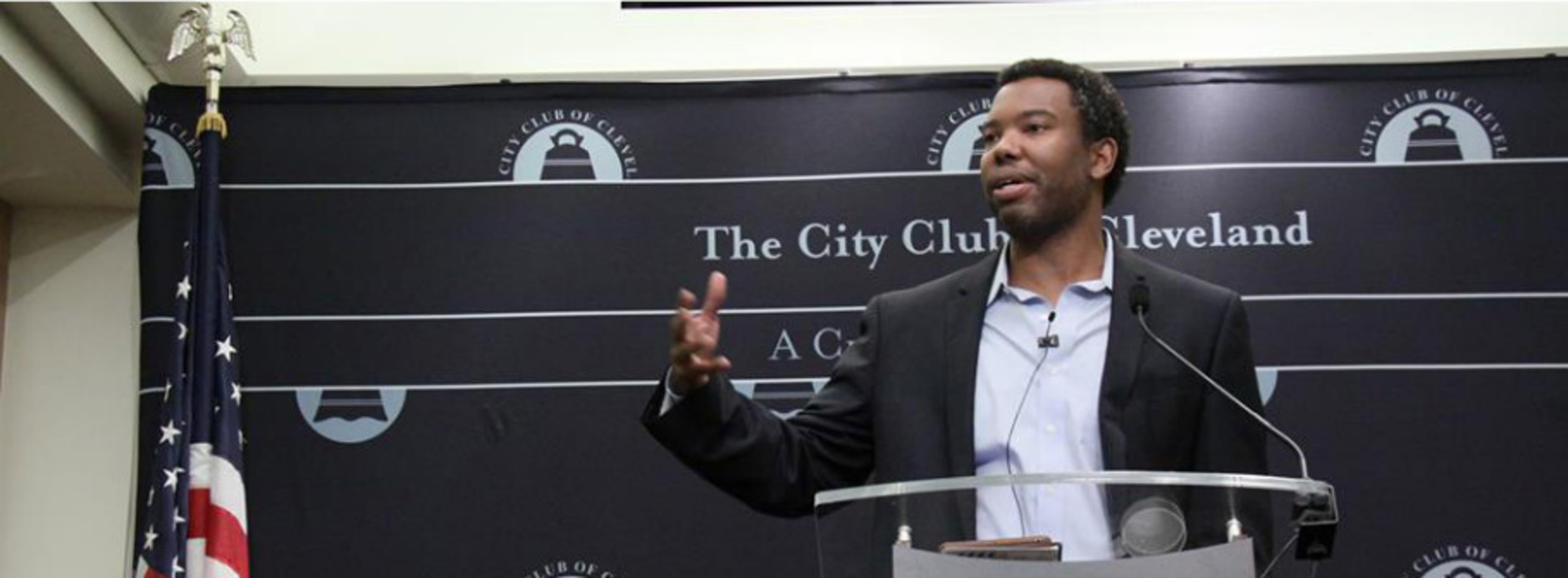Wednesday, October 29, 2014
The Case For Reparations Revisited
Ta-Nehisi Coates, a writer for The Atlantic, wrote an article on May 21, 2014, grabbing the attention of many. In “The Case for Reparations” he argues America is responsible not only for the monetary compensation of the African American community, but that it is America’s moral obligation to make amends for the wrong it has done. Coates spoke at the City Club of Cleveland Friday, August 22.
I am no expert, but I have taken an African American history class, so I am at least have a basic knowledge of racial inequality. Slavery, the middle passage, Jim Crow laws, sharecroppers, lynching, KKK, burning of churches and homes, Emmett Till, the complete robbery of every human right—I get it. I understand. I really do. Decades and decades, I understand. However, what good does it do for America repays to the African American community now? Why add to an unreasonable pool of money being handed out for something that the recipients themselves haven't experienced? Slavery is long gone, and while this may sound to some like a tired argument, it also makes a lot of sense. Coates argues that the African American community is still crippled by the past damages of slavery. Although this torment is undeniably horrific, if you yourself have not experienced that specific event or adversity, it is only possible to experience a vague idea of what happened. That is the case for almost all African Americans today.
As for racism, every race experiences it in one manner or another. Just google “violence against whites,” or read a blog on the subject, and you will know. There is a gang in my neighborhood that targets white people who are walking alone—gaining points for every white male or female who has been jumped. Whether you are Indian, Arab, Asian, or any other type of ethnicity, you are bound to face racism. As for the recent riot in Ferguson, where an unarmed black teenager was shot by a white officer, there was a similar case in Utah, where a white unarmed male, Dillon Taylor, was shot by a black officer on August 11th. The media, however, focused on the Ferguson case.
I am in no way attempting to diminish the significance of the racism experienced by the African American community. In American, it is not uncommon to be judged by the color of one’s skin or appearance. Here’s the thing—unless we all, individually, decide to change the way we think and make the decision not to judge others, racism will continue to be an issue in our communities. Coates uses words such as “compassion” and “pragmatism” to describe the need for reparations, suggesting it would lead to “spiritual renewal”. However, if people single themselves out as victims, humanity as a whole will not be able to achieve anything. It is about fighting for your world, not just fighting for your race.
I cannot express how important African American history is. I agree with Coates that African Americans are the foundation upon which this nation was built. There is no denying the contributions of their free labor to the wealth that our country is still known for. Honestly, African American history ought to be a mandatory course for all high school students.
But the real issue is your own mindset and the mindset of those you surround yourself with. For example, if you wake up every morning willing to work past the adversities, rather than blaming others for your personal downfalls, you will experience much greater success. The enslavement of your ancestors cannot be the excuse for why some cannot achieve success in their daily lives.
A very inspirational African American woman, Susan Taylor, spoke at the City Club of Cleveland months ago. She also spoke of the problems within the Black community, highlighting various factors that differentiate it from other communities. For example, Taylor stated that half of all Black and Latino students drop out of high school. Listening to this statistic, I became convinced of the truth of the statement "you get out what you put in." If you do not care about education, you will not get educated; without the building blocks of success, how can you be successful? The government has provided enough. Proper schooling systems exist where you can be successful regardless of your race due to SSI benefits and many other programs to help with assistance. But what about the broken families, HIV, young black women who have high rates of having children before the age of 18? Is this also the fault of America because it had caused slavery? I think Coates bases his argument on a slight logical fallacy: Post Hoc Ergo Propter Hoc, the assumption that one thing happens to be the cause of the other, just because of the order of events.
So when Coates says, "And just as black families of all incomes remain handicapped by lack of wealth...", it seems to me as if he is making excuses. If we are going to better America, we are going to have to better it as a whole, working on not only to improve black communities, but all impoverished communities. In my view, we need to focus on bettering humanity, not just a select few communities.
Coates also said, "…the implications are chilling. As a rule, poor black people do not work their way out of the ghetto—and those who do often face the horror of watching their children and grandchildren tumble back." This statement begs the question, How is this America's fault?
Andrew Carnegie's Gospel of Wealth proposes that we do not simply hand out money to those in need, but invest that money in the community. I agree completely. What I do not believe is that providing "reparations" for something that has no ties to current generations—except in the case of ongoing racism for all cultures and ethnicities.
It’s a simple concept. Just change the way you think.






